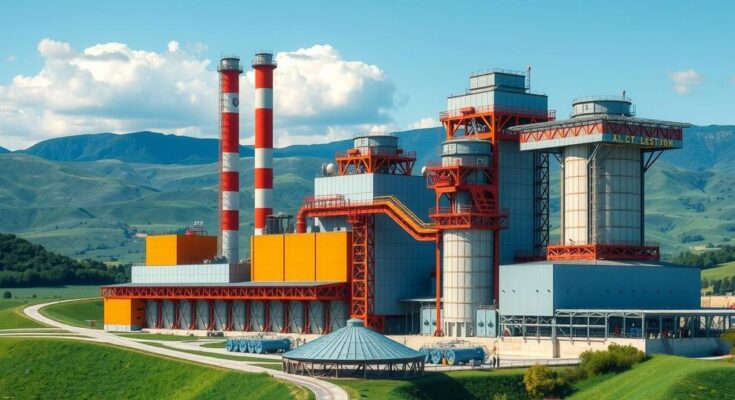The newly inaugurated Mutun steel plant in Puerto Suarez, Bolivia, funded by the Export-Import Bank of China, aims to fulfill half of the national steel demand and stimulate economic recovery. Expected to create 1,000 jobs, the plant will produce 200,000 metric tons of steel annually, significantly reducing import reliance. Plans for further collaboration with China and improving trade routes are underway to boost Bolivia’s economy and export capacities.
A major steel plant financed by the Export-Import Bank of China has been inaugurated in Puerto Suarez, Bolivia. The $546 million Mutun plant, operated by Sinosteel Engineering and Technology, aims to fulfill half of Bolivia’s steel demand, thus aiding the nation’s economic recovery and industrial advancement. With an expected output of 200,000 metric tons of steel annually, this development is poised to create about 1,000 jobs amidst economic challenges such as low foreign reserves and high inflation.
The plant’s operation will significantly cut back on Bolivia’s foreign expenditure on steel imports and increase the country’s steel export capability, as noted by Omar Portillo, an economics professor at the Higher University of San Andres. He emphasized the importance of steel exports for reaching competitive prices in northeastern Brazil. This venture has overcome a history of delays that lasted decades, primarily caused by a previous contractor’s withdrawal in 2012, until China’s investment ultimately revived the project.
With existing plans for a second steel plant in the works, this initial plant is projected to substantially elevate Bolivia’s iron and steel exports, which were valued at $23.51 million in 2023. China’s involvement in Bolivia’s mining and industrial sectors has been profound, with Bolivian exports to China reportedly amounting to $1.21 billion in 2023, largely comprising precious metals and ores.
Furthermore, experts predict that Bolivia’s market access to China will broaden, especially concerning agricultural products. Juan Jose Bedregal, an economist, noted the significance of both bilateral trade and investment from major Chinese companies in sectors such as lithium. Bolivia’s alignment with China in pursuit of a multipolar world within the BRICS framework adds another layer of opportunity for economic growth.
In addition to the direct benefits of the steel plant, Portillo pointed out the need for Bolivia to diversify its fuel supply sources and suggested an integration route with Chancay Port in Peru to enhance trade logistics. He concluded that such plans, strengthened by the relationship with China, could considerably improve Bolivia’s export potential.
The inauguration of the Mutun steel plant in Puerto Suarez represents a significant step toward enhancing Bolivia’s economic recovery and industrial capacity, primarily driven by China’s financial support. Through job creation, reduced import reliance, and increased export opportunities, this initiative illustrates the strategic importance of collaboration between Bolivia and China. The prospects of expanding trade relationships and further investments reinforce Bolivia’s potential for economic development in a multipolar global context.
Original Source: global.chinadaily.com.cn




